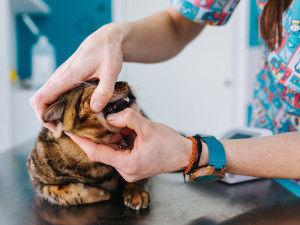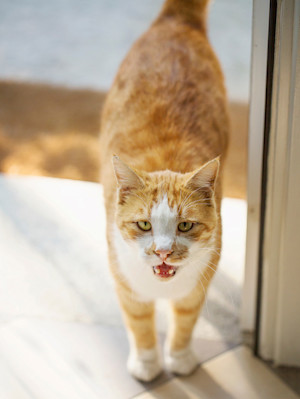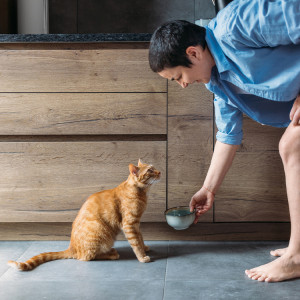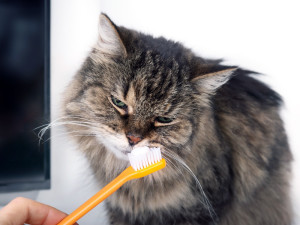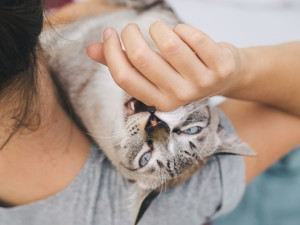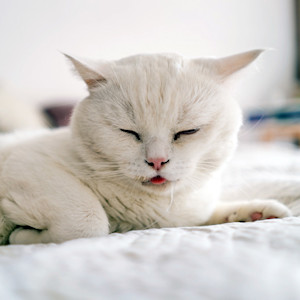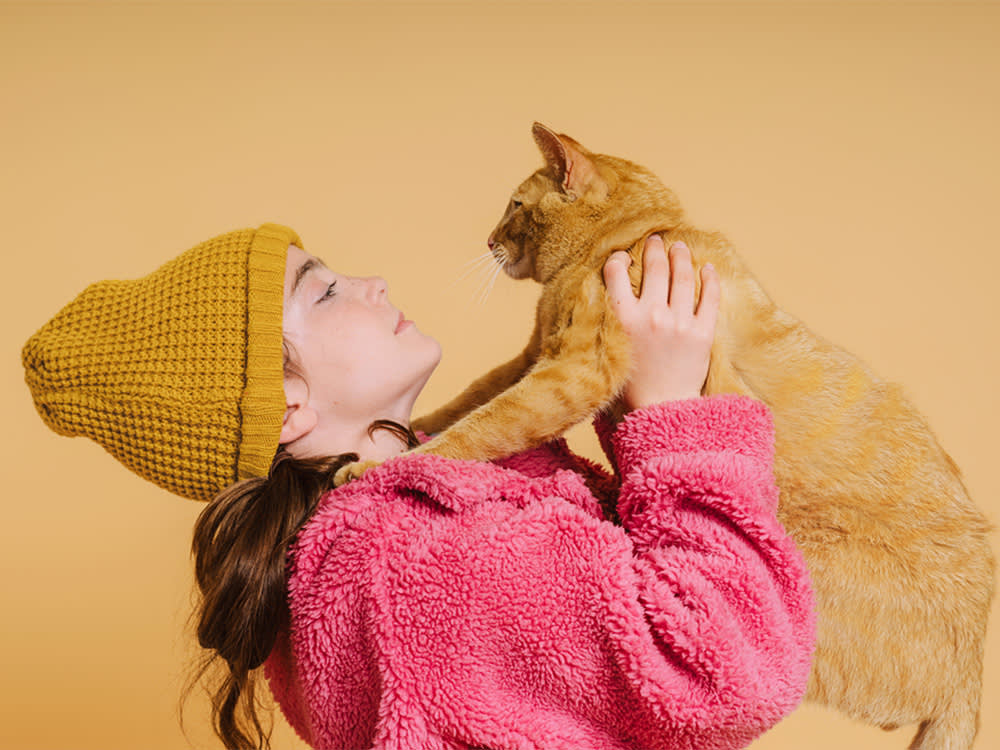
Share Article
In this article:
What causes bad breath in cats? How to treat bad breath in cats
Have you ever been cuddling with your cat, only to be hit by a wave of unpleasant breath? While occasional bad breath is normal, a persistent foul odour can be a sign of dental problems or other feline health issues that require attention.
What causes bad breath in cats?
Cats are generally pretty good at keeping themselves clean and relatively odourless. Apart from litter box hassles, cats are typically considered tidy and odour-free. But sometimes bad odours can leave you asking, “why does my cat’s breath smell like fish?” Bad kitty breath can ruin a cat’s pristine reputation. Here are some reasons why your cat’s mouth may smell a little ‘off’.
Periodontal disease
Periodontal disease is inflammation of the tissues that support the teeth. It is the most common oral disease in cats. Plaque that accumulates on the teeth can cause inflammation of the gums (gingivitis). Without treatment, bacteria will continue to infiltrate the tissue surrounding the teeth, leading to inflammation and odour.
Other oral issues
Outside of periodontal disease, there are other issues that can cause oral inflammation, ulceration, infection and bad odour. Cats can develop bad breath from:
stomatitis (inflammation of the soft tissue in the mouth)
electric shock from chewing on electrical cords
ingesting caustic chemicals
oronasal fistulas (abnormal connections between the nose and mouth)
oral cancer
injuries of abscess in the mouth
foreign body lodged in the mouth or throat
Kidney disease
One of the kidneys’ main jobs is to remove waste and toxins from the blood. When the kidneys aren’t functioning properly, those waste products can build up in the bloodstream, a condition called uraemia. One of the symptoms of uraemia in cats is ‘uraemic breath’ – an ammonia-like odour to a cat’s breath.
Diabetes
Diabetes mellitus is a disease in which blood sugar levels are too high due to insulin resistance or insufficient insulin production. When diabetes is unregulated, a cat’s body can start to break down fat for energy because it’s not able to use glucose. This fat breakdown leads to ketone formation. High levels of ketones can cause a cat’s breath to have an unusual sweet smell, sometimes called ‘ketotic breath’. Because not everyone has the ability to smell ketones, sniffing for ketotic breath isn’t a good screening test for unregulated diabetes.
Dietary issues
A cat’s eating habits can impact how their breath smells. If a cat is eating stinky stuff, such as dead carcasses and faeces, that’s bound to lead to a bit of bad breath. Depending on what the cat has eaten for their main meal, you can sometimes smell a strongly flavoured food on their breath but this odour should dissipate shortly after eating. Cats will often lick their lips and paws to clean their face after eating so the fur around their face and on their paws may also smell of food temporarily.
Respiratory issues
Excessive mucus production from the nose can lead to an overall unpleasant odour coming from a cat’s face. If the mucus is due to infection, nasal tumours or nasal foreign bodies, this is more likely to cause cat bad breath and sneezing.
Gastrointestinal disease
Gastrointestinal diseases, like megaoesophagus, can cause stinky cat breath. Megaoesophagus occurs when a cat’s oesophagus is flaccid and dilated, making it difficult for food to be pushed down into the stomach. Food tends to sit in the oesophagus or be regurgitated back into the mouth, and will start to ferment and smell. Cats with gastrointestinal obstruction can also have foul-smelling vomit and breath.
How to treat bad breath in cats
Toothbrushing
Plaque accumulates on teeth every day. If not removed, it causes inflammation of the gum called gingivitis which is the first stage of periodontal (gum) disease. By brushing your cat’s teeth every day you can help prevent or reverse gingivitis before it progresses to severe periodontal disease which will require dental treatment at the vets. Think brushing a cat’s teeth sounds impossible? Be sure to use cat-safe toothpaste and follow our helpful guide.
Dental treats
Cat parents can also opt for dental treats and chews to help control bad breath. While crunching on these treats, the plaque and tartar are reduced as the abrasive fibres wipe the surface of the tooth. Be sure to keep treats to less than 10 percent of your cat’s daily calorie intake.
Water additives
Water additives can help reduce plaque and bacteria in cats’ mouths, leading to fresher breath. When introducing a dental additive to your cat’s water, monitor closely to ensure that your cat is still drinking well. If your cat is completely put off and refusing to drink, opt for a different flavour or skip additives all together.
When searching for water additives or dental treats, start with products approved by the Veterinary Oral Health Council (VOHC), a group of veterinary dental health professionals who look into the efficacy of pet dental products.
Balanced diet
Sometimes, cats eat faeces due to behavioural issues, stress or nutritional deficiencies. You can help eliminate the chances of this by always keeping the litter tray fresh and clean, always removing any waste as quickly as possible. It’s best practice to have the litter tray in a separate room away from the food and water bowls. Nutrition wise, check that your cat is eating a complete and balanced diet, with nutrients tailored to the cat’s life-stage and lifestyle.
When to seek veterinary attention
Your cat’s mouth isn’t always going to smell squeaky clean. A little odour is normal, especially after meal time. But bad breath should not be ignored, especially if it is consistent, appears suddenly or accompanies other symptoms. Concerning symptoms include:
pain when eating
dropping food
facial swelling
nasal discharge
excessive drooling
lethargy
changes in behaviour
being less interactive
meowing
rubbing their face on furniture
reluctance to have their face touched
drinking more water than normal and urinating more frequently
When investigating your cat’s halitosis, your vet will start with a medical history and a physical exam. Be sure to report any changes in appetite, water intake or litter box habits. If it’s clear that your cat has dental disease, your vet will want to perform a full oral exam. This may require sedation depending on your kitty’s temperament and level of discomfort.
If your cat’s bad breath is not obviously dental in origin, blood work and a urinalysis can be performed to look for systemic issues such as kidney disease or diabetes. Radiographs can help rule out gastrointestinal disorders like megaoesophagus or obstruction. If the nasal cavity is suspected to be the source of the smell, imaging like rhinoscopy can directly evaluate the nasal cavity for foreign bodies, tumours, or abnormal tissue.
As always, prevention is easier than treatment. Regular checkups and dental care can help prevent health issues, saving cats from discomfort.
Frequently asked questions
How do you treat bad breath in cats?
Bad breath in cats should be evaluated by a vet to determine the cause and best treatment. At home, cat parents can combat bad cat breath with tooth brushing (with cat-safe toothpaste), dental treats, water additives and a well-balanced diet.
What is the best cat-bad-breath remedy?
The best cat bad breath remedy is to seek veterinary advice. Your cat may need a professional cleaning to get rid of bad breath. For at-home care, the best remedy is the one you’ll stick with and your cat will tolerate.
Why does my cat chew on everything?
Cats may chew for many reasons, including curiosity, boredom and gastrointestinal issues. If your cat is a chewer, eliminate access to toxic plants, electrical cords and objects that can be accidentally swallowed. And talk to your vet.
References:
2019 AAHA Dental Care Guidelines for Dogs and Catsopens in new tab
Practical Dental Care Tips for Dogs and Catsopens in new tab

Dr. Bartley Harrison, DVM
Dr. Bartley Harrison is a veterinarian with more than nineteen years of experience. He has worked in both large and small emergency and specialty veterinary practices, treating a variety of species; primary interests includes emergence medicine and critical care.
Related articles
![Curious cat sniffing on toothpaste on toothbrush held by pet owner.]()
How to Brush Your Cat’s Teeth
It sounds like a daunting task, but here are some helpful steps to take
![cat biting person's hand]()
How to Make Your Cat’s Oral Care as Stress-Free as Possible
Take things slow to figure out what works best for their pearly whites
![white cat with eyes closed drooling]()
Dogs Rule, Cats Drool, Right?
Sometimes it works the other way round – here’s why your cat is drooling
![Cute black cat with short fur grimacing as her anonymous owner is brushing her teeth with a toothbrush to maintain good dental health.]()
Your Cat Hates When You Brush Their Teeth — Here’s What to Do
You can still maintain their dental health without getting an unfortunate bite

